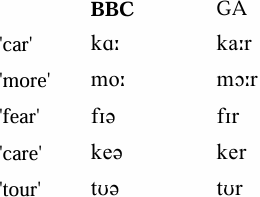
American
 المؤلف:
Peter Roach
المؤلف:
Peter Roach
 المصدر:
English Phonetics and Phonology A practical course
المصدر:
English Phonetics and Phonology A practical course
 الجزء والصفحة:
239-20
الجزء والصفحة:
239-20
 2024-11-16
2024-11-16
 1363
1363
American
In many parts of the world, the fundamental choice for learners of English is whether to learn an American or a British pronunciation, though this is by no means true everywhere. Since we have given very little attention to American pronunciation in this course, it will be useful at this stage to look at the most important differences between American accents and the BBC accent. It is said that the majority of American speakers of English have an accent that is often referred to as General American (GA); since it is the American accent most often heard on international radio and television networks, it is also called Network English. Most Canadian speakers of English have a very similar accent (few British people can hear the difference between the Canadian and American accents, as is the case with the difference between Australian and New Zealand accents). Accents in America different from GA are mainly found in New England and in the "deep south" of the country, but isolated rural communities everywhere tend to preserve different accents; there is also a growing section of American society whose native language is Spanish (or who are children of Spanish speakers) and they speak English with a pronunciation influenced by Spanish.
The most important difference between GA and BBC is the distribution of the r phoneme, GA being rhotic (i.e. r occurs in all positions, including before consonants and at the end of utterances). Thus where BBC pronounces 'car' as kɑ: and 'cart' as ka:t, GA has kɑ:r and ka:rt. Long vowels and diphthongs that are written with an ‘r’ in the spelling are pronounced in GA as simple vowels followed by r. We can make the following comparisons:

American vowels followed by r are strongly "r-colored", to the extent that one often hears the vowel at the centre of a syllable as a long r with no preceding vowel. The GA vowel in 'fur', for example, could be transcribed as з:r (with a transcription that matched those for the other long vowels in the list above), but it is more often transcribed з with a diacritic - to indicate that the whole vowel is "r-colored". Similarly, the short "schwa" in GA may be r-colored and symbolized as in 'minor' maɪnə. It would be wrong to assume that GA has no long vowels like those of the BBC accent: in words like 'psalm', 'bra', 'Brahms', where there is no letter 'r' following the 'a' in the spelling, a long non-rhotic vowel is pronounced, whose pronunciation varies from region to region.
One vowel is noticeably different: the Q of 'dog', 'cot' in BBC pronunciation is not found in GA. In most words where the BBC accent has Q we find a: or o:, so that 'dog', which is dɒg in BBC, is dɑ:g or dɔ:g in American pronunciation. In this case, we have a phonological difference, since one phoneme that is present in BBC pronunciation is absent in American accents. Other segmental differences are phonetic: the l phoneme, is almost always pronounced as a "dark l" in American English: the sound at the beginning of 'like' is similar to that at the end of 'mile'. The pronunciation of t is very different in American English when it occurs at the end of a stressed syllable and in front of an unstressed vowel. In a word like 'betting', which in BBC pronunciation is pronounced with a t that is plosive and slightly aspirated, American speakers usually have what is called a "flapped r" in which the tip of the tongue makes very brief contact with the alveolar ridge, a sound similar to the r sound in Spanish and many other languages. This is sometimes called "voiced t", and it is usually represented with the symbol t̬.
There are many other differences between American and English pronunciation, many of them the subject of comic debates such as "You say tomato (tə'meɪt̬ əʊ) and I say tomato (tə'mɑ:təʊ)."
 الاكثر قراءة في Phonetics and Phonology
الاكثر قراءة في Phonetics and Phonology
 اخر الاخبار
اخر الاخبار
اخبار العتبة العباسية المقدسة


